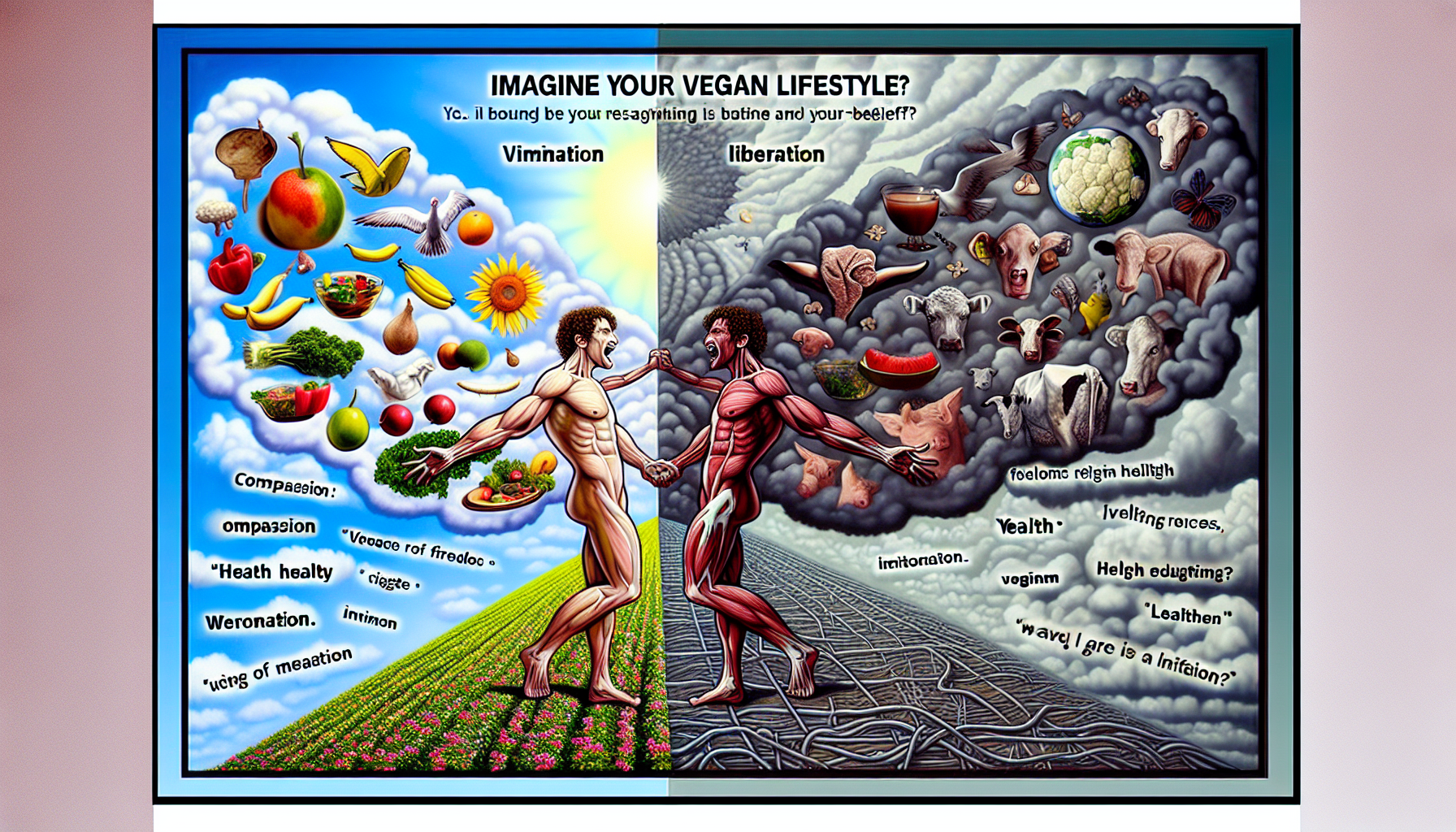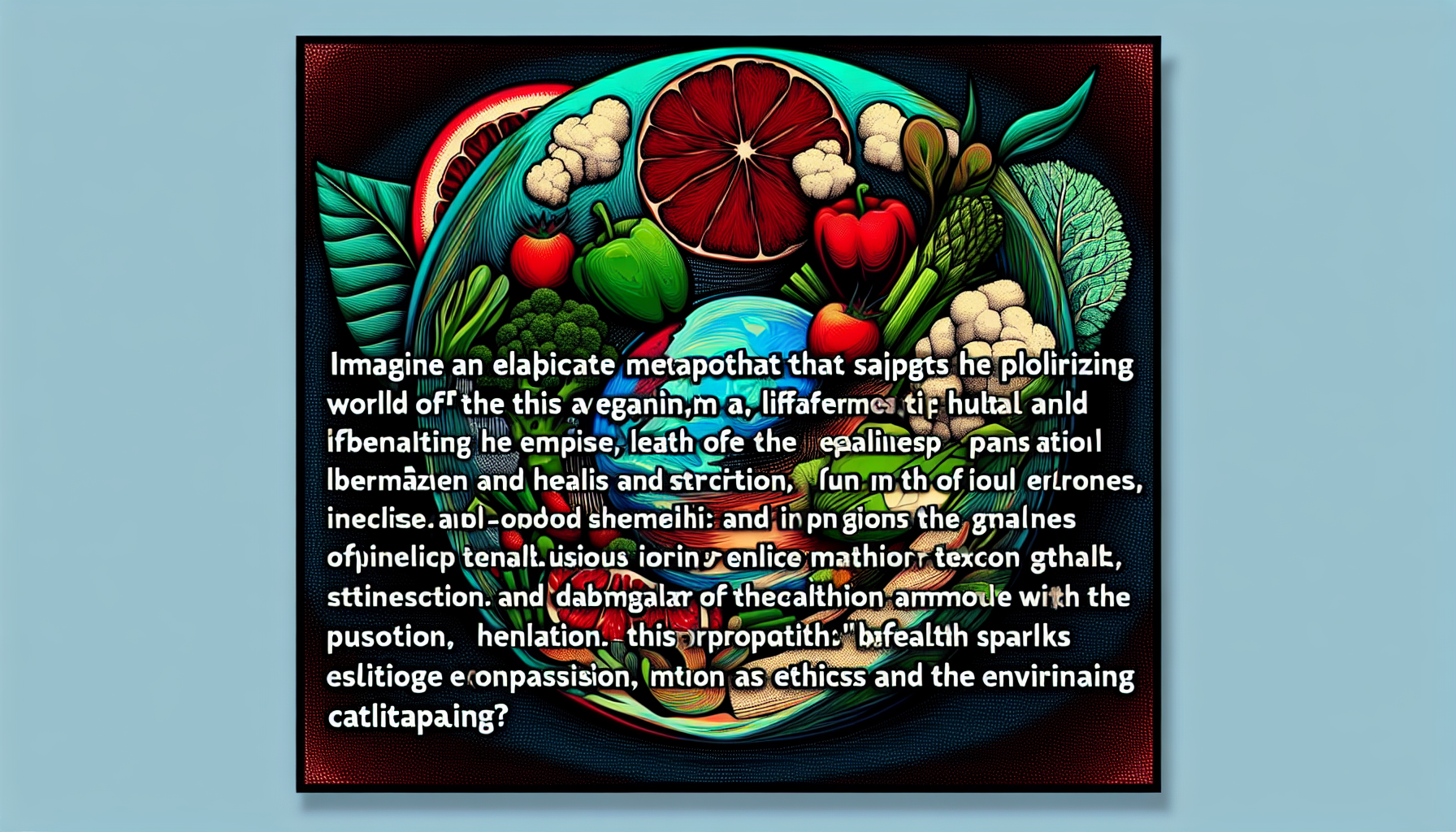Are you considering adopting a vegan lifestyle but unsure if it’s the right choice for you? Look no further! This article will provide you with a balanced perspective on the pros and cons of living a vegan lifestyle. By exploring the benefits and challenges that come with this plant-based diet, you’ll be well-equipped to make an informed decision about whether to embark on this journey of compassion and sustainability. So, grab a cup of tea and get ready to discover the exciting world of veganism!
Table of Contents
Health Benefits
Reduced risk of chronic diseases
Following a vegan lifestyle can significantly reduce the risk of chronic diseases such as heart disease, type 2 diabetes, and certain types of cancer. A plant-based diet is rich in fiber, antioxidants, and phytochemicals, which can help lower cholesterol levels, reduce inflammation, and improve blood sugar control. By eliminating animal products and focusing on whole, plant-based foods, you can support your overall health and reduce the risk of developing these illnesses.
High intake of vitamins and minerals
A vegan diet promotes a high intake of vitamins and minerals, as it is naturally abundant in fruits, vegetables, legumes, whole grains, nuts, and seeds. These plant-based foods are rich sources of vital nutrients such as vitamin C, vitamin E, folate, potassium, and magnesium. By consuming a variety of these nutrient-dense foods, you can ensure that your body receives the vitamins and minerals it needs for optimal health and wellbeing.
Improved heart health
Choosing a vegan lifestyle can have a positive impact on your heart health. By avoiding saturated and trans fats found in animal products, you can lower your cholesterol levels and reduce the risk of heart disease. Plant-based foods are also naturally low in sodium, which helps maintain healthy blood pressure levels. Furthermore, the abundant fiber content in a vegan diet promotes healthy digestion, regulates blood sugar levels, and supports overall cardiovascular health.
Better digestion and gut health
A plant-based diet can significantly improve digestion and promote a healthy gut. The high fiber content in fruits, vegetables, and whole grains promotes regular bowel movements and prevents constipation. Additionally, plant-based foods contain a wide variety of naturally occurring beneficial bacteria and prebiotic fibers that support a healthy gut microbiome. A balanced and diverse gut microbiome has been linked to numerous health benefits, including improved digestion, strengthened immunity, and enhanced overall wellbeing.
Weight management
Following a vegan lifestyle can be beneficial for weight management. Plant-based diets are generally lower in calories and saturated fats compared to diets that include animal products. Additionally, the high fiber content in plant-based foods helps you feel fuller for longer, reducing the likelihood of overeating. By choosing whole, minimally processed plant-based foods and practicing portion control, you can achieve and maintain a healthy weight while supporting your overall health and wellbeing.
Environmental Impact
Reduced greenhouse gas emissions
Choosing a vegan lifestyle can contribute to the reduction of greenhouse gas emissions. Livestock farming is a significant contributor to greenhouse gas emissions, particularly methane and nitrous oxide. By eliminating animal products from your diet, you can significantly reduce your carbon footprint, helping combat climate change and protect the environment.
Preservation of natural resources
Adopting a vegan lifestyle promotes the preservation of natural resources. Animal agriculture requires vast amounts of land, water, and feed to sustain livestock production. By reducing our dependence on animal products, we can help conserve precious natural resources such as forests, water sources, and biodiversity. This conservation effort is essential for the long-term sustainability of the planet and its delicate ecosystems.
Lower water usage
Livestock farming is a water-intensive industry, requiring large amounts of water for animal hydration, feed production, and meat processing. By choosing a vegan lifestyle, you can significantly reduce your water footprint. Plant-based diets generally require less water for food production and promote the conservation of this vital resource. By opting for plant-based alternatives, you contribute to the sustainability of water sources and protect this precious commodity for future generations.
Less deforestation
The production of animal-based food products often leads to deforestation, as vast areas of land are cleared to create pastures or cultivate animal feed crops. This deforestation, predominantly in regions like the Amazon rainforest, disrupts ecosystems, destroys biodiversity, and contributes to climate change. By committing to a vegan lifestyle, you actively participate in the effort to reduce deforestation, preserve natural habitats, and protect the biodiversity of our planet.
Decreased pollution
Animal agriculture is a significant contributor to various forms of pollution, including water pollution and air pollution. The excessive use of fertilizers and pesticides in animal feed cultivation can contaminate water sources, negatively impacting aquatic ecosystems and human health. Additionally, the significant production of animal waste can lead to the release of pollutants into the air, further degrading air quality. By choosing plant-based foods, you contribute to reducing pollution and promoting a healthier environment for all.

Ethical Considerations
Animal welfare and rights
Choosing a vegan lifestyle aligns with a strong commitment to animal welfare and rights. By avoiding animal products, you take a stance against the exploitation and mistreatment of animals in the food industry. Consuming plant-based foods ensures that animals are not subjected to harm, confinement, or unnecessary suffering for our dietary choices. By making ethical decisions regarding our food, we promote compassion and respect for all living beings.
Reduction of animal exploitation
A vegan lifestyle actively reduces animal exploitation by refusing to support industries that profit from their suffering. By eliminating animal products from our diet, we eliminate the demand and financial support for industries that often prioritize profit over animal welfare. The conscious decision to live without animal products is a powerful way to advocate for the rights and wellbeing of animals, helping create a more compassionate and empathetic society.
Opposition to factory farming
Factory farming is a practice commonly associated with the intensive and inhumane treatment of animals. By adopting a vegan lifestyle, you take a stand against these unethical practices and express your opposition to factory farming. Supporting plant-based alternatives and advocating for sustainable and humane practices encourages a shift towards more compassionate and responsible methods of food production.
Support for sustainable and humane practices
Choosing a vegan lifestyle supports and encourages sustainable and humane practices in the food industry. By demanding plant-based alternatives and supporting companies that prioritize ethical sourcing and production methods, you contribute to the growth of a more sustainable and compassionate food system. Promoting these practices not only benefits animal welfare but also fosters environmental conservation and the overall wellbeing of our planet.
Promotion of compassion towards animals
Living a vegan lifestyle is an embodiment of compassion towards animals. By consciously choosing to abstain from consuming animal products and advocating for their rights, you promote a culture of compassion, empathy, and respect for all living beings. Through your choices, you inspire others to reflect on their own relationship with animals and contribute to a more compassionate and harmonious society.
Weight and Fitness
Effective weight loss
For those seeking weight loss, adopting a vegan lifestyle can be a highly effective approach. Plant-based diets tend to be lower in calories and saturated fats, making it easier to maintain a calorie deficit needed for weight loss. The high fiber content in plant-based foods also aids in promoting satiety and reducing hunger cravings. By incorporating a wide variety of whole foods and practicing portion control, you can achieve your weight loss goals while maintaining a balanced and nutritious diet.
Increased energy levels
A vegan lifestyle can lead to increased energy levels and overall vitality. Plant-based foods are rich in complex carbohydrates, which provide a steady release of energy throughout the day. Unlike the temporary energy spikes and crashes associated with processed foods, the sustained energy from whole plant-based foods supports a stable and productive daily routine. By fueling your body with nutrient-dense plant foods, you can experience improved physical and mental energy levels.
Boosted athletic performance
Adopting a vegan lifestyle can enhance athletic performance and fitness levels. Many successful athletes have embraced plant-based diets, citing improvements in endurance, recovery time, and overall performance. Plant-based foods provide an abundance of complex carbohydrates, essential vitamins, minerals, and antioxidants, which support optimal athletic performance. By fueling your body with plant-based nutrition, you can train effectively, reduce inflammation, and achieve peak physical performance.
Enhanced recovery time
Following a vegan lifestyle can accelerate recovery time after physical activity and exercise. Plant-based diets are naturally rich in anti-inflammatory compounds and antioxidants, which aid in reducing exercise-induced inflammation and oxidative stress. The high fiber content of plant-based foods also supports optimal digestion and nutrient absorption, allowing your body to efficiently recover and repair muscles after intense workouts. By incorporating plant-based foods into your diet, you can enhance your post-workout recovery and optimize your training regimen.
Reduced inflammation
A vegan lifestyle can contribute to the reduction of chronic inflammation in the body. Animal products, particularly those high in saturated fats, have been linked to pro-inflammatory responses in the body. By eliminating or significantly reducing these foods, you can lower your overall inflammation levels, reducing the risk of chronic diseases such as arthritis, heart disease, and certain types of cancer. Consuming a plant-based diet rich in fruits, vegetables, whole grains, and legumes can support a balanced inflammatory response and promote optimal health.

Access to Nutrients
Protein sources
One concern often raised about a vegan lifestyle is the availability of sufficient protein. However, many plant-based foods are excellent sources of protein, including legumes (such as lentils and chickpeas), tofu, tempeh, seitan, quinoa, and edamame. By incorporating a variety of these protein-rich plant-based options into your diet, you can easily meet your protein requirements and support muscle growth and repair.
Iron-rich foods
Iron is an essential mineral for the body, and while it is commonly associated with animal products, it is also readily available in plant-based foods. Plant sources of iron include leafy greens (such as spinach and kale), legumes, fortified cereals, tofu, tempeh, and seeds. To enhance iron absorption, consuming plant-based sources of vitamin C, such as citrus fruits or bell peppers, alongside iron-rich foods can be beneficial. By incorporating a diverse range of iron-rich plant-based foods into your diet, you can meet your iron needs and ensure optimal health.
Calcium alternatives
Calcium is crucial for strong bones and teeth, and while dairy products are often associated with calcium, there are numerous plant-based alternatives available. Fortified plant-based milks (such as soy, almond, or oat milk), tofu, tempeh, leafy greens (like broccoli and bok choy), and calcium-set tofu are all excellent sources of calcium. By including these plant-based options in your diet, you can easily meet your calcium requirements and maintain strong and healthy bones.
Omega-3 fatty acids
Omega-3 fatty acids are essential for brain health, heart health, and reducing inflammation in the body. While they are commonly found in fish and seafood, plant-based sources of omega-3 fatty acids are also available. Foods such as flaxseeds, chia seeds, walnuts, hemp seeds, and algae-based supplements provide an abundant supply of these beneficial fats. By incorporating these plant-based sources of omega-3 fatty acids into your diet, you can support optimal brain function, heart health, and overall wellbeing.
Vitamin B12 supplementation
Vitamin B12, an essential nutrient for nerve function and the production of red blood cells, is primarily found in animal-based products. As a vegan, it is important to supplement your diet with vitamin B12 to ensure adequate intake. Vitamin B12 supplements, fortified plant-based foods (such as plant-based milks, breakfast cereals, and nutritional yeast), and occasional consumption of fortified vegan meat substitutes can help meet your vitamin B12 needs. Regular monitoring of your vitamin B12 levels and consultation with healthcare professionals can ensure proper supplementation and long-term health.
Social Challenges
Limited dining options
Transitioning to a vegan lifestyle can sometimes present challenges when dining out, as many restaurants may have limited vegan options. However, with the growing popularity of plant-based diets, more establishments are now offering vegan-friendly choices. Researching and planning ahead can help you find restaurants, cafes, and food outlets that cater to your dietary preferences. Additionally, seeking vegan or vegetarian-friendly restaurants or opting for ethnic cuisines that naturally emphasize plant-based ingredients can expand your dining options and enhance your social experiences.
Difficulties with family and friends
Adopting a vegan lifestyle may sometimes be met with skepticism or resistance from family and friends who may not fully understand or embrace your choices. Educating those around you about the health and ethical benefits of a vegan lifestyle can help foster understanding and support. Engaging in open and respectful conversations, sharing delicious plant-based meals, and leading by example can inspire others to be more receptive to your dietary choices and potentially encourage them to explore the benefits of plant-based eating for themselves.
Navigating social events
Attending social events, such as parties, gatherings, or celebrations, can present challenges when adhering to a vegan lifestyle. It may be helpful to communicate your dietary preferences or restrictions with the event host beforehand, allowing them to accommodate your needs. Alternatively, you can offer to bring a vegan dish to share, ensuring there is at least one option you can enjoy. When attending events with limited vegan options, focusing on the available plant-based options like fresh fruits, vegetables, and side dishes can help you navigate these situations with ease.
Potential judgment and criticism
Living a vegan lifestyle can sometimes invite judgment or criticism from others who may not agree or understand your choices. It is important to remember that everyone is entitled to their own opinions and that your decision to adopt a vegan lifestyle is personal and reflects your values. Practicing self-confidence and resilience, seeking support from like-minded communities or online vegan groups, and surrounding yourself with individuals who are open to different perspectives can help you deal with potential judgment or criticism in a positive and empowering manner.
Requirement for meal planning and preparation
When following a vegan lifestyle, meal planning and preparation are important aspects of maintaining a balanced diet. Planning your meals ahead of time can help ensure that you have access to a variety of nutritious and satisfying plant-based options. Experimenting with new recipes, batch cooking, and utilizing simple meal-prep strategies can help streamline your meal planning and preparation process. Embracing this aspect of a vegan lifestyle can bring joy and creativity to your culinary experience while enabling you to meet your nutritional needs effectively.
Cost Considerations
Higher grocery expenses
One potential challenge of a vegan lifestyle can be higher grocery expenses. While staple vegan foods such as grains, legumes, fruits, and vegetables can be cost-effective, specialty vegan products or plant-based meat substitutes may be more expensive. To manage costs, focusing on whole, unprocessed plant-based foods, buying in bulk, and incorporating seasonal produce can be budget-friendly strategies. Additionally, growing your own fruits, vegetables, or herbs, when possible, can further reduce grocery expenses and provide a rewarding sense of self-sufficiency.
Need for specialty vegan products
Some individuals may choose to incorporate specialty vegan products, such as plant-based cheese, milk alternatives, or meat substitutes, into their diet. While these products can enhance variety and convenience, they often come with a higher price tag compared to their animal-based counterparts. It is important to prioritize budgeting and find a balance that works for you. Emphasizing whole, plant-based foods as the foundation of your diet, with occasional indulgence in specialty products, can help manage costs without compromising your vegan lifestyle.
Price variations based on location
The cost of vegan products and produce may vary based on geographical location. Access to affordable vegan options can sometimes be limited in certain areas, especially in food deserts or regions with less diverse food options. However, with the increasing popularity of veganism, more mainstream grocery stores and local markets are expanding their plant-based offerings. Exploring a range of shopping options, including local farmers’ markets, co-ops, or online platforms, can help you find affordable vegan alternatives that meet your needs, regardless of your location.
Potential need for dietary supplements
As with any diet, there may be a need for dietary supplements to ensure adequate nutrient intake. Vitamin B12 supplementation is particularly important for vegans, as it is primarily found in animal-based foods. Additionally, monitoring your vitamin D, iron, omega-3 fatty acids, and calcium levels with the guidance of healthcare professionals can help you identify and address any potential deficiencies. While dietary supplements add to the cost of a vegan lifestyle, they are essential for long-term health and can be easily incorporated into your daily routine.
Long-term financial impact
Adopting a vegan lifestyle can have a long-term financial impact that extends beyond immediate grocery expenses. Investing in your health through nutrient-dense, plant-based foods can potentially lead to reduced healthcare costs in the long run. By prioritizing preventive health measures, supporting sustainable farming practices, and advocating for a more ethical and environmentally conscious food system, your vegan lifestyle contributes to creating a more sustainable, compassionate, and resilient world for future generations.
Time and Effort
Ingredient sourcing and label reading
Transitioning to a vegan lifestyle may require additional time and effort when it comes to ingredient sourcing and label reading. Familiarizing yourself with vegan-friendly ingredients, learning to identify animal-derived additives, and understanding food labeling practices can initially be overwhelming. However, as you become more knowledgeable and experienced, this process becomes easier and more intuitive. Exploring local farmers’ markets, specialty stores, or online platforms dedicated to vegan products can simplify ingredient sourcing and support your commitment to a vegan lifestyle.
Meal preparation and cooking
Meal preparation and cooking are essential aspects of a vegan lifestyle, as they allow you to control the quality and nutritional content of your meals. While this may require more time and effort compared to relying on pre-packaged or convenience foods, it can also be a rewarding and empowering experience. Embracing meal preparation as an opportunity for creativity, exploring new recipes, and involving family or friends in the cooking process can make it enjoyable and help you build a repertoire of nutrient-dense, plant-based meals that suit your tastes and preferences.
Potential need for homemade alternatives
Some specialty vegan products or convenience foods may not be readily available or may be costly. In these cases, making homemade alternatives can be a cost-effective solution. For example, making your own plant-based milk, cheese, or meat substitutes can empower you to control the ingredients, flavors, and nutritional content of these products. While homemade alternatives may require more time and effort, they can be customized to suit your preferences and dietary needs, making your vegan lifestyle even more fulfilling.
Time spent researching and educating oneself
Transitioning to a vegan lifestyle often involves dedicating time to research and educate oneself about nutrition, ingredient alternatives, and plant-based cooking techniques. Expanding your knowledge through reliable sources, such as books, documentaries, reputable websites, or seeking guidance from registered dietitians or nutritionists, is essential to ensure a well-balanced and nutritionally adequate vegan diet. This investment in education empowers you to make informed decisions, experiment with new flavors and ingredients, and embrace the benefits of a vegan lifestyle with confidence.
Commitment to maintaining a balanced diet
Maintaining a balanced vegan diet requires commitment and an ongoing effort to ensure adequate nutrient intake. It is essential to consume a variety of plant-based foods from different food groups to meet your nutritional needs. This commitment involves regularly assessing your diet for potential gaps and addressing them through diverse food choices and, if necessary, supplements. By staying attuned to your body’s needs, consulting with healthcare professionals, and prioritizing a balanced approach, you can optimize your health and thrive on a vegan lifestyle.
Social and Cultural Impact
Promotion of sustainable practices
Adopting a vegan lifestyle promotes sustainable practices by reducing the demand for animal products and supporting alternative food production methods. By voicing your commitment to plant-based eating, you contribute to the growing movement for a more sustainable and equitable food system. Encouraging others to explore plant-based alternatives, advocating for responsible sourcing and production methods, and supporting local and sustainable agriculture can collectively create a positive impact on environmental conservation and the overall sustainability of our planet.
Encouragement of a plant-based movement
Living a vegan lifestyle contributes to the broader plant-based movement, inspiring others to reevaluate their consumption choices and embrace a more compassionate and sustainable way of living. By leading by example and sharing your personal journey, you encourage others to question the status quo and foster positive change. Embracing a plant-based lifestyle goes beyond individual preferences; it signifies a conscious commitment to the wellbeing of animals, the planet, and future generations.
Shift in societal norms and attitudes
As more individuals embrace veganism, there is a noticeable shift in societal norms and attitudes towards plant-based eating. The growing acceptance of veganism prompts increased availability of vegan options at restaurants, grocery stores, and food establishments. This shift not only benefits practicing vegans but also offers more dietary choices for those with specific dietary restrictions or preferences. By actively participating in the vegan movement, you contribute to cultural and social change, paving the way for a more inclusive and sustainable food culture.
Influence on the food industry
The rise of the vegan lifestyle has created a significant influence on the food industry. Food companies are responding to the demand for plant-based alternatives, leading to an expansion of vegan product offerings. This increased availability of vegan options extends beyond grocery store shelves, reaching fast-food chains, restaurants, and even fine dining establishments. By actively supporting vegan-friendly businesses and making conscious purchasing decisions, you directly influence the food industry to prioritize sustainability, ethical sourcing, and the development of innovative plant-based products.
Reevaluation of food production methods
The growing popularity of veganism encourages a reevaluation of traditional food production methods. As more individuals choose plant-based alternatives, farmers, and food producers are exploring innovative, sustainable, and ethical approaches to agriculture. This shift includes the adoption of regenerative farming practices, minimizing pesticide use, and exploring plant-based alternatives to animal-derived ingredients. The vegan lifestyle stimulates critical discussions and fosters collaborations that can lead to positive changes in food production methods, benefiting both the environment and human health.
Potential Nutritional Gaps
Risk of nutrient deficiencies
While a well-planned vegan diet can provide all necessary nutrients, there is a potential risk of nutrient deficiencies if dietary choices are not adequately balanced. Nutrients that vegans should pay particular attention to include vitamin B12, iron, calcium, omega-3 fatty acids, and iodine. Regular monitoring of nutrient levels and consulting with healthcare professionals or registered dietitians can help address and prevent potential deficiencies. By maintaining awareness and proactively managing your nutritional intake, you can enjoy the health benefits of a vegan lifestyle while ensuring optimal wellbeing.
Gaining enough calories and balanced macronutrients
For some individuals, particularly those with high energy requirements, gaining enough calories and balanced macronutrients may be a concern on a vegan diet. Plant-based foods tend to be less calorie-dense compared to animal-based foods, making it important to incorporate adequate servings of whole grains, legumes, nuts, and seeds. Balancing macronutrients by including sources of plant-based proteins, healthy fats, and complex carbohydrates is crucial for meeting energy needs and maintaining optimal health. Working with healthcare professionals or registered dietitians can help ensure adequate calorie and macronutrient intake.
Ensuring adequate vitamin and mineral intake
While a vegan lifestyle can provide abundant vitamins and minerals, it is essential to ensure adequate intake through a well-planned and diversified diet. Particular attention should be given to sources of vitamin B12, iron, calcium, iodine, zinc, and omega-3 fatty acids. Incorporating a variety of plant-based foods, consuming fortified products, and considering supplements when necessary can help bridge potential gaps in vitamin and mineral intake. Regular monitoring of nutrient levels and consultation with healthcare professionals can ensure that your nutritional needs are met and prevent deficiencies.
Monitoring and addressing individual nutritional needs
Every individual is unique, and nutritional needs can vary based on factors such as age, sex, activity levels, and overall health. It is important to be mindful of these individual considerations when following a vegan lifestyle to ensure optimal nutrition and wellbeing. Regular check-ups, monitoring biomarkers, and consulting with healthcare professionals or registered dietitians can help address specific nutritional needs and adapt your vegan diet accordingly. By personalizing your approach to a vegan lifestyle, you can thrive and enjoy the full range of health benefits it offers.
Consulting healthcare professionals for guidance
Navigating the potential nutritional challenges of a vegan lifestyle can be best managed with the guidance of healthcare professionals, such as registered dietitians or nutritionists. These professionals can provide personalized advice based on your specific nutritional needs, goals, and health status. Consulting with healthcare professionals allows for regular monitoring of nutrient levels, individualized dietary recommendations, and a comprehensive understanding of your overall health. Their expertise ensures that your vegan lifestyle is not only fulfilling and enjoyable but also optimally supports your long-term health and wellbeing.
In conclusion, adopting a vegan lifestyle brings various health benefits, including reduced risk of chronic diseases, high intake of essential vitamins and minerals, improved heart health, better digestion, and weight management. It also has a positive environmental impact, reducing greenhouse gas emissions, preserving natural resources, mitigating water usage, preventing deforestation, and decreasing pollution. Ethical considerations are central to veganism, advocating for animal welfare, opposing animal exploitation, and supporting sustainable and humane practices. The vegan lifestyle also offers advantages for weight management, fitness, recovery time, and inflammation reduction. Careful consideration must be given to accessing nutrients through protein sources, iron-rich foods, calcium alternatives, omega-3 fatty acids, and vitamin B12 supplementation. Social challenges, cost considerations, time and effort invested, and long-term impacts on health and the environment are important aspects to be prepared for while embracing a vegan lifestyle. The societal and cultural impact of veganism promotes sustainability, encourages plant-based movements, challenges societal norms, influences the food industry, and stimulates the reevaluation of food production methods. Lastly, potential nutritional gaps can be addressed through careful monitoring, understanding individual needs, and seeking guidance from healthcare professionals. Overall, the adoption of a vegan lifestyle can have far-reaching positive effects on your health, the environment, and the societies we live in.





